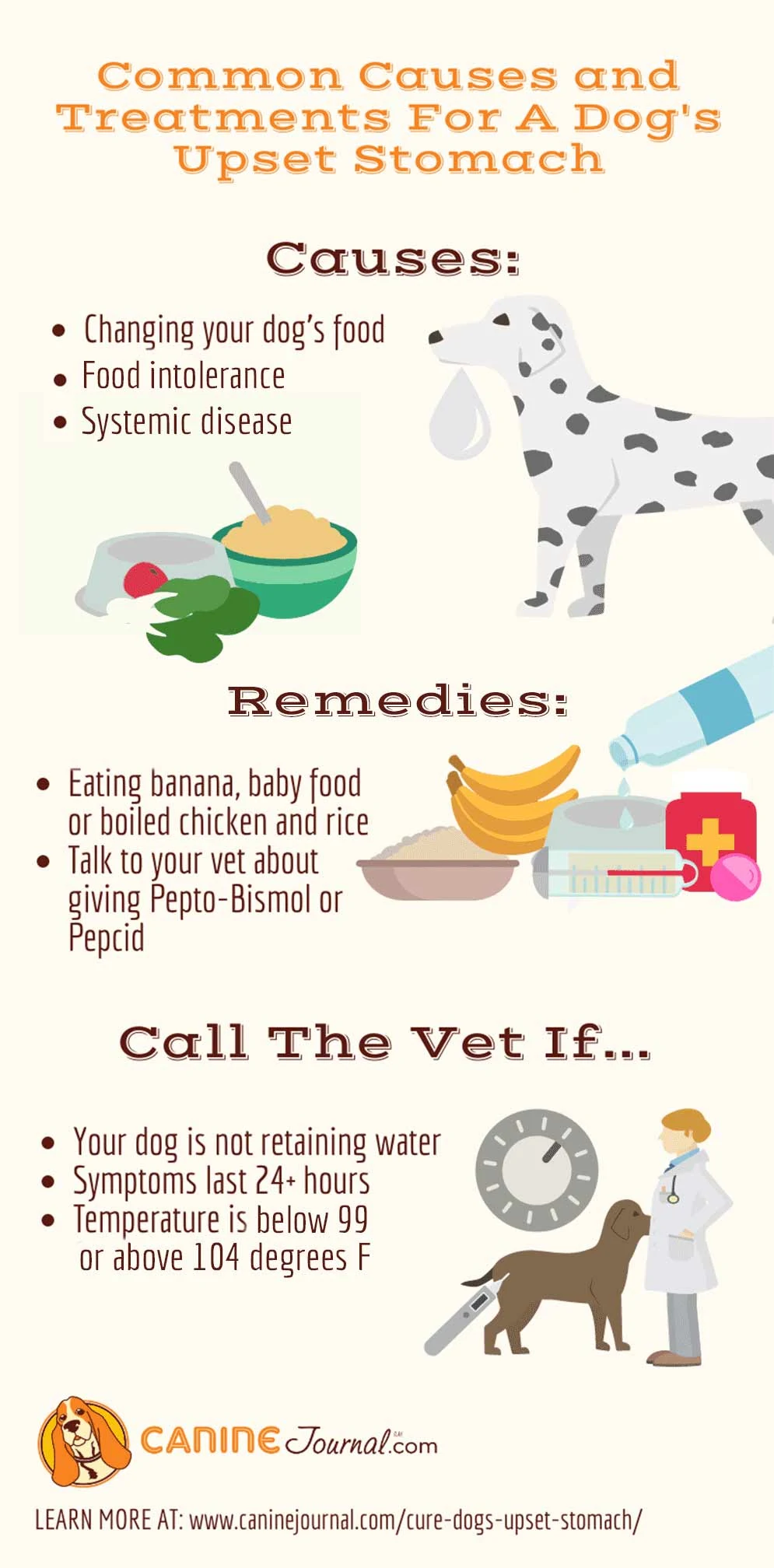If your dog has an upset stomach, you can give them boiled rice and lean meat. This simple and bland meal can help soothe their digestive system. Dealing with a dog’s upset stomach can be a challenging and concerning experience for pet owners. From dietary indiscretions to sudden dietary changes, numerous factors can contribute to this uncomfortable situation for dogs. However, providing the appropriate care and diet can help alleviate symptoms and aid recovery.
This article will explore the common causes of upset stomachs in dogs, symptoms to watch out for, and effective home remedies and treatments to help your furry companion feel better. Whether it’s bland food, proper hydration, or seeking veterinary assistance, these strategies can make a significant difference in your dog’s well-being.

Home Remedies For Soothing A Dog’s Upset Stomach
Relieve your dog’s upset stomach with these effective home remedies. From boiled chicken and rice to probiotics and ginger, there are safe and natural options to help soothe your furry friend’s tummy troubles.
Fasting
When your furry friend is dealing with an upset stomach, one simple yet effective home remedy is fasting. Giving your dog’s digestive system a break from food allows it time to heal and recover. Just like humans, dogs can benefit from a short period of fasting when they’re feeling unwell.
Bland Diet
A bland diet is another helpful home remedy for soothing a dog’s upset stomach. A bland diet consists of easily digestible foods that are gentle on your dog’s stomach. This can include boiled chicken, white rice, and plain yogurt. This combination provides nourishment without putting too much strain on their digestive system.
Probiotics
Adding probiotics to your dog’s diet can also aid in easing their upset stomach. Probiotics are beneficial bacteria that help maintain a healthy balance in the gut. These “good” bacteria can improve digestion and reduce inflammation in the digestive tract. Speak to your vet about the best probiotic supplement for your furry friend.
Small And Frequent Meals
Instead of feeding your dog large meals, opt for smaller and more frequent meals to help soothe their upset stomach. This approach helps prevent overwhelming their digestive system while still providing necessary nourishment. Dividing their daily food intake into several smaller meals throughout the day can alleviate discomfort and aid in their recovery.
Implementing these home remedies can play a vital role in providing relief to your dog’s upset stomach. Remember to consult with your vet to determine the underlying cause of the upset stomach and ensure the appropriate home remedy is used. By taking these measures, you can help your furry friend feel better and regain their normal appetite in no time.
Over-the-counter Options For Treating A Dog’s Upset Stomach
An upset stomach can make your furry friend uncomfortable and restless. While it’s essential to consult a veterinarian for serious issues, there are over-the-counter options that can help alleviate your dog’s discomfort. Here are some common over-the-counter options for treating a dog’s upset stomach:
Antacids
Antacids can be beneficial in providing relief to dogs with upset stomachs. They work by neutralizing excess stomach acid, which can help soothe your dog’s discomfort. Familiar antacids such as Pepcid AC or Prilosec are often recommended by veterinarians for mild gastrointestinal upset in dogs.
Anti-diarrheal Medications
For cases of diarrhea, anti-diarrheal medications can be used to help control and manage the symptoms. Common over-the-counter options such as Imodium can help slow down diarrhea and provide some relief to your dog. However, it’s crucial to follow the proper dosage instructions and consult with a veterinarian before administering any medication to your pet.
Prescription Medications For Alleviating A Dog’s Upset Stomach
When your furry friend is suffering from an upset stomach, sometimes prescription medications can provide relief. It’s important to consult with a veterinarian before administering any prescription medications to your dog, as they will be able to recommend the most suitable option based on your dog’s symptoms and health condition.
Anti-nausea Medications
A common type of prescription medication for alleviating a dog’s upset stomach is anti-nausea medication. These medications can help reduce vomiting and nausea in dogs, providing them with comfort and relief. Veterinarians may prescribe medications such as Maropitant or Ondansetron to help manage your dog’s nausea and vomiting.
Prescription Diets
In addition to medications, veterinarians may also recommend prescription diets specifically designed to aid in resolving gastrointestinal distress in dogs. These specialized diets often include easily digestible ingredients and can help soothe your dog’s upset stomach. Popular prescription diets for upset stomachs include brands such as Hill’s Prescription Diet i/d and Royal Canin Gastrointestinal.
Remember, before starting any prescription medication for your dog’s upset stomach, it’s crucial to seek guidance from a qualified vet to ensure the most appropriate and effective treatment for your furry companion.

Credit: www.caninejournal.com
Natural Remedies For Relieving A Dog’s Upset Stomach
When our furry friends are experiencing an upset stomach, it can be concerning for us as pet parents. Luckily, there are natural remedies that can help relieve your dog’s digestive discomfort. These remedies provide a gentle and effective way to soothe your dog’s upset stomach without relying on medications or chemicals. Some of the best natural remedies for alleviating a dog’s upset stomach include Aloe Vera, Ginger, and Chamomile. Let’s explore the benefits of each of these remedies and how they can help your dog find relief.
Aloe Vera
Aloe Vera is not just a popular ingredient in skincare products, but it can also offer great support for your dog’s digestive system. This natural plant has amazing healing properties and can aid in reducing inflammation and soothing the digestive tract. Aloe Vera is rich in vitamins, minerals, and enzymes that can help calm an upset stomach in dogs. You can give your dog Aloe Vera in the form of ready-made Aloe Vera juice or gel, which is available in most pet stores. Be sure to choose Aloe Vera products that are specifically made for pets and avoid giving your dog products that contain any added sugars or artificial preservatives.
Ginger
Ginger is a powerful herb that has been used for centuries to address various stomach issues in humans and animals alike. It has natural anti-inflammatory properties that can help reduce nausea and irritation in the digestive system. Ginger is also known for its ability to relieve gas and aid digestion. To use ginger for your dog’s upset stomach, you can prepare ginger tea by steeping a few slices of fresh ginger in hot water and allowing it to cool. Once cooled, you can offer the ginger tea to your dog in small amounts, using a syringe or a dropper if needed. Alternatively, you can grate fresh ginger and mix it into your dog’s food.
Chamomile
Chamomile is a gentle and calming herb that can help soothe your dog’s upset stomach. It has anti-inflammatory properties that can reduce inflammation in the gastrointestinal tract and promote relaxation. Chamomile also acts as a mild sedative, which can help ease any anxiety or discomfort your dog may be experiencing. To use chamomile for your dog’s upset stomach, you can prepare a chamomile tea by steeping a chamomile tea bag in hot water and allowing it to cool. Once cooled, you can offer the chamomile tea to your dog in small amounts. Chamomile tea can also be used topically to calm irritated skin or paws.
When To Seek Veterinary Assistance For A Dog’s Upset Stomach
If your furry friend is experiencing an upset stomach, it’s natural to wonder when it’s time to consult a veterinarian. While some cases of canine indigestion may resolve on their own with a little home care, there are certain situations where seeking veterinary assistance is crucial. Keeping an eye on your dog’s symptoms and knowing when to take action can help ensure their well-being. Let’s explore two scenarios where veterinary help may be necessary.
Persistent Or Severe Symptoms
If your dog’s stomach troubles persist for more than a day or if their symptoms are severe, it’s time to reach out to your veterinarian. While occasional bouts of diarrhea or vomiting are relatively common, persistent symptoms could indicate a more serious underlying issue. It’s essential not to ignore these signs and take appropriate action to determine the cause.
Here are some red flags to watch out for:
- Bloody or black diarrhea
- Severe abdominal pain
- Continual vomiting
- Refusal to eat or drink
These symptoms may indicate gastrointestinal blockage, infection, pancreatitis, or other potentially dangerous conditions that require immediate veterinary attention. By seeking prompt assistance, you’re giving your dog the best chance at a quick and effective recovery.
Underlying Health Conditions
Dogs with pre-existing health conditions may be at higher risk for developing complications from an upset stomach. If your furry friend has a chronic illness such as diabetes, kidney disease, or inflammatory bowel disease, it’s crucial to consult your veterinarian when they experience gastrointestinal issues.
Here’s why:
- Underlying health conditions can affect digestion and increase the likelihood of complications.
- Medications used to manage these conditions can interact with over-the-counter treatments.
- Regular monitoring and adjustments of treatment plans may be necessary for optimal management.
By involving your vet in the care of your dog’s upset stomach, you can ensure a comprehensive approach to their health and minimize the risks associated with their specific condition.

Credit: www.thewildest.com
FAQ Of A Dog For An Upset Stomach
What Can I Give My Dog For An Upset Stomach?
If your dog has an upset stomach, you can try feeding them a bland diet of boiled chicken and rice. This can help soothe their stomach and provide them with easily digestible nutrients. Make sure to consult your veterinarian before giving any medication or making changes to your diet.
Can I Give My Dog Pepto-Bismol For An Upset Stomach?
While Pepto-Bismol may provide temporary relief for your dog’s upset stomach, it is not recommended to give it to them without consulting your veterinarian first. Some ingredients in Pepto-Bismol can be harmful to dogs, so it’s best to seek professional advice to ensure your dog’s safety and to address the underlying cause of their stomach issues.
How Long Does An Upset Stomach Last In Dogs?
The duration of an upset stomach in dogs can vary depending on the cause and severity of the condition. Generally, mild cases can resolve within 24 to 48 hours with proper care and dietary adjustments. However, if your dog’s symptoms persist or worsen, it is important to consult your veterinarian for further evaluation and treatment options.
Conclusion
When your dog experiences an upset stomach, it’s important to take prompt and appropriate action. By following these simple and natural remedies, such as a bland diet, fasting, and probiotics, you can effectively alleviate your dog’s discomfort and help their digestive system recover.
Remember, always consult with your veterinarian for specific guidance and recommendations tailored to your dog’s unique needs. Your furry friend will be feeling better in no time!



